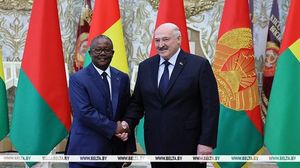In a landmark move for international trade, the United Kingdom and India have finalized a significant trade agreement that is poised to reshape economic relations between the two nations. Announced on May 8, 2025, the pact is expected to nearly double bilateral commerce, which stood at $21 billion in the year ending March 2024. This deal comes at a crucial time as both countries seek to enhance their economic resilience amidst global uncertainties.
The trade agreement, which might come into effect after a year, has garnered attention for its potential winners and losers across various sectors. According to Radhika Rao, an economist at DBS Bank Ltd., the deal is a stepping stone that could set a precedent for future agreements, including those with the European Union and the United States.
One of the most significant aspects of the agreement is the reduction of tariffs on automobiles. Initially, tariffs on fossil fuel-powered vehicles will be slashed from 110% to 10%, with plans to extend similar reductions to electric and hybrid vehicles over a ten-year timeline. This move is particularly beneficial for luxury brands like Jaguar Land Rover (JLR), which has a manufacturing base in the UK. However, domestic carmakers in India, such as Mahindra & Mahindra and Maruti Suzuki, may face increased competition as they navigate this new landscape.
In the liquor sector, tariffs on whiskey and gin will be halved from 150% to 75%, eventually settling at 40% by the tenth year of the deal. This reduction is expected to make premium spirits more accessible to Indian consumers. Praveen Someshwar, managing director at Diageo India, expressed optimism, stating that the treaty will improve accessibility and choice of Scotch in the world's largest whiskey market. However, the duty cuts may negatively impact homegrown brands like Royal Ranthambore, as noted by Elara Capital's Karan Taurani.
Textiles represent another vital area of trade, with India exporting approximately £900 million worth of clothing to the UK in 2024. The removal of tariffs is anticipated to enhance India's competitiveness against countries like Bangladesh and Vietnam. Apparel retailers such as Marks and Spencer and Primark are already considering shifting their sourcing to India, according to P Senthilkumar, a partner at Vector Consulting. Following the announcement, shares of Gokaldas Exports Ltd. and Welspun Living Ltd. surged by 12%, while Indo Count Industries Ltd. rose by 11.3%.
The medical devices market will also benefit, with Indian exporters able to sell products like cardiac implants and syringes at lower costs in the UK. Rajiv Chhibber, joint coordinator at the Association of Indian Manufacturers of Medical Devices, highlighted the potential for increased supply of electronic goods from the UK to India as part of the agreement.
On the financial services front, the deal aims to secure UK companies' ability to deliver services to clients in India, fostering cooperation in financial technology and easing international payments for tourists, students, and businesses.
Meanwhile, on the other side of the globe, Prime Minister Keir Starmer announced a separate yet equally impactful trade deal with the United States, which includes a 10% tariff on car exports to the US for 100,000 vehicles annually. This agreement, revealed during a visit to the Jaguar Land Rover factory in Solihull, is expected to protect thousands of jobs in the UK’s automotive sector.
Starmer emphasized the importance of this deal, stating, "This is a deal that will protect British businesses and save thousands of jobs in Britain, really important, skilled, well-paid jobs." The reduction of tariffs from 27.5% to 10% for these vehicles is a significant relief for manufacturers, particularly JLR, which exports a substantial portion of its cars to the US.
The US-UK trade deal, which includes provisions for tariff-free trade on Rolls-Royce engines and the purchase of $10 billion worth of Boeing planes, is valued at £5 billion for US companies. Starmer's approach, characterized by 'quiet diplomacy,' was highlighted as a pragmatic strategy to secure favorable terms for British workers and businesses.
Industry experts have lauded the deal as a significant step forward for the UK automotive sector. Jim Saker, president of the Institute of the Motor Industry, noted that the alleviation of tariffs is a positive development for UK manufacturers, which were previously facing substantial financial burdens.
In addition to the automotive sector, the US-UK trade agreement encompasses various industries, including ethanol, beef, and machinery, showcasing a broad commitment to enhancing trade relations.
As both the India-UK and US-UK trade agreements come into play, the implications for economic growth, job security, and market competitiveness are profound. With these deals, both countries are positioned to benefit from increased trade opportunities, albeit with some sectors facing challenges amid the evolving landscape.
The success of these agreements will ultimately depend on the details and implementation of the terms laid out, as stakeholders across industries await further clarification on how these changes will unfold.
In summary, the recent trade deals signify a pivotal moment for the UK as it seeks to strengthen its economic ties with both India and the US, navigating the complexities of global trade dynamics while aiming to bolster domestic industries.





